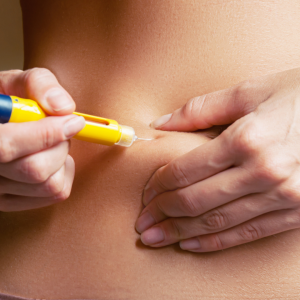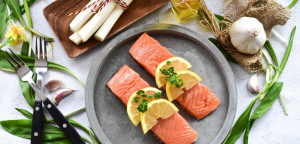

5 Nutrition Tips to Optimise Ovulation Induction
Ovulatory disorders are the leading cause of sub-infertility. This may present differently from woman to woman but is characterized by not ovulating at all or not ovulating frequently. This is often experienced by women who have PCOS. A fertility dietitian can help to optimise your diet and body weight to improve PCOS associated symptoms that impact fertility. Making diet and lifestyle changes can improve fertility and the success of fertility treatments by up to 69%.
To celebrate women’s health week, I have my Nutrition Plus colleague Catherine Chong who is a dietitian that has special interest in IVF and fertility. She joined me live answering your nutrition questions and sharing her nutrition tips!
Watch here:
This article is co-written by Lora Attia and Catherine Chong
What is ovulation Induction?
Ovulation induction involves taking a hormone medication (orally or via injection) that stimulates your body to produce, development and mature one or more follicles. This process also supports an egg to be released from the follicle. Ovulation induction treatments are taken for 5 days, starting on the 5th day of the menstrual period. Ovulation is expected to occur approximately 5-10 days after commencement.
What can I do to prepare for ovulation induction and optimise my results?
1. How is weight important for ovulation induction?
If you are trying to get pregnant or plan to start a family, the closer you are to a healthy weight, the greater your chance of getting pregnant and having a healthy baby. Whether it is too high or too low in body fat, your weight can affect your ability to get pregnant.
Although the evidence for the impact of weight on ovulation induction treatment is conflicting, we know so far that obese women tend to respond poorly to ovulation induction Clomid and require higher doses of injectable gonadotrophins for ovulation induction.
Fewer oocytes were retrieved for overweight women when compared to women with normal weight. Another study suggested that embryo quality can also be affected by BMI.
If you’re carrying excess weight, making a plan to lose weight with the help of a fertility dietitian is a key step before ovulation induction. Even a small amount of weight loss (5-10%) can help to improve ovulation induction success and prepare your body for a healthy pregnancy to minimize common pregnancy complications such as gestational diabetes.
2. Calculate your BMI: BMI Calculator | Healthy Weight Guide to determine whether you are within a health weight range. A healthy BMI is between 18.5-25 and below that would be under weight and over 25 would be overweight. To optimize outcomes of ovulation induction it is recommended a woman’s BMI be between 25-29, for better outcomes of fertility treatments. However when looking at BMI a fertility dietitian will also take into account your lifestyle, activity level and want to determine your body fat percentage. A fertility dietitian can request a body composition scan to determine body fat. This is helpful for those who are also within a healthy BMI as they too can have excess fat stores that are important to optimise, as a high body fat percentage impacts hormones.
One way to start optimizing your body weight is to get to know your diet more personally.
Here are some tips to help you get started:
- Use a food diary to determine how many calories you are consuming common free apps include MyFitnessPal | MyFitnessPal.com and Food Nutrition Facts and Free Calorie Counter | CalorieKing (Australia)
- Have a closer look at where your highest calories are coming from and try to reduce the portions
- increase more plant foods that are rich in folate, fibre and antioxidants like dark green leafy vegetables, citrus fruits and legumes
- Avoid unnecessary calories from alcohol, soft drinks and added sugars to teas and coffee
We all know making dietary changes can be challenging so involve your partner and a health professional like fertility dietitian to keep you accountable! This helps so many women succeed at weight loss than on their own. A fertility dietitian will also ensure that you are meeting your micronutrients that are important for fertility and ceasing any rapid weight loss close to egg collection which may impact egg health.
However for some women who have PCOS and insulin resistance, losing weight can be challenging and will need a tailored approach. Approximately 80% of women with PCOS are affected by insulin resistance and this can be an underlying cause of ovulatory infertility,
Treating insulin resistance
The best way to manage insulin resistance is to start choosing low GI carbohydrate foods. GI is a ranking of how much a carbohydrate food affects your blood sugar level, and hence the amount of insulin hormone your body needs to release to cope with that sugar load. In other words, the lower the GI value of the food, the better the quality of carbohydrate food it is.
Many low GI foods are also found in whole grains foods, which are highly nutritious and fertility-friendly. Whole-grain foods contain a layer of bran and germ, which provides B vitamins, E, fibre, antioxidants, and healthful fats.
It’s also interesting to note that a prospective cohort study in the US found that women who consume more whole-grain foods before the IVF treatment were associated with a higher probability of implantation and live birth and an increase in endometrial thickness on the day of embryo transfer.
Find examples of low GI whole-grain foods include: Two Fertility Dietitians Top 5 Tips to Optimise Ovulation with PCOS – Lora Attia (dietitianformums.com.au)

3. Optimizing egg health
A woman is born with all the eggs she will ever have at birth and over time it declines, particularly over the age of 35. However it is important to the quality of these eggs is important and diet can support egg health. These tips are particularly important for those undergoing, fertility treatments, IVF and egg freezing.
Here are some tips to improve your egg quality:
- Allow at least 1-3 months prior to fertility treatments to optimize the health of your eggs through diet and tailored supplementation as it takes 90 days for an egg to mature!
- Ensure your vitamin D is adequate in the lead up to conception! An Italian study demonstrated that women with adequate vitamin D were more likely to conceive.
We know that women with PCOS are at higher risk of being deficient and supplementation should be tailored according to your blood results for the greatest impact.
- Make sure your diet is rich in Zinc, CO-Q10, Omega 3’S and antioxidants which were all identified to have a benefit for fertilization and egg health. Tip: include oysters as a part of your fertility diet as they are rich in zinc that’s good for egg and sperm health!
- Rethink your cooking methods: we know that BBQ, char grilling and cooking at high temperatures increase oxidative stress and inflammation around the follicles impacting egg health. Try boiling, poaching and steaming instead.
4. Reduce body inflammation
The current study shows that anti-inflammatory foods may help to improve PCOS. The omega-3 fatty acids (healthy fats) play an important role in immune regulation, insulin sensitivity and ovulation.
The follicular fluid surrounding the maturing oocyte contains fatty acids essential for follicular growth and oocyte quality. One observational study suggests that the omega-3 helps protect the oocyte from free radical damage.
Current guidelines recommend at least 200mg DHA and/or EPA Omega-3 per day before and during pregnancy, equating to two oily fish meals per week.
Fish is the best source of omega-3, with oily fish such as:
- Salmon
- trout,
- sardines
- mackerel
If you don’t like eating fish or any seafood, you may require a fish oil supplement. A fertility dietitian will calculate and determine the best form of omega-3 supplement you need.

Other Tips:
Cessation of smoking and alcohol consumption three months before ovulation induction will be helpful to improve the ovulation induction success. It takes three months to optimise egg health. Start putting these tips in place today!
Need some extra help before undergoing ovulation induction?
Fertility – 12 Week Program – Lora Attia (dietitianformums.com.au)
Catherine Chong l One-On-One Fertility Nutrition Program



